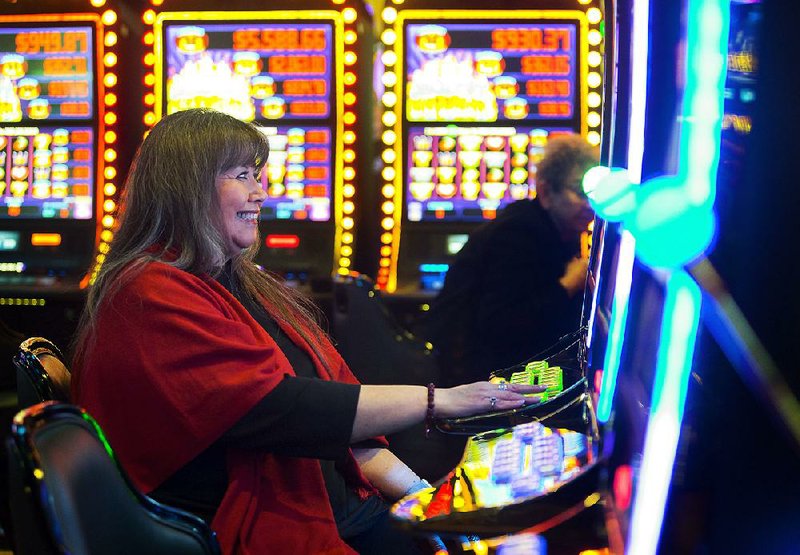The Cherokee Nation just opened its 10th casino in Grove, Okla., in the state's northeast corner near the Grand Lake area and close to the Arkansas state line.
The $39 million casino is nearly 40,000 square feet and has 400 electronic games, along with a full service bar, a restaurant with lunch and dinner options, a dance floor and a music venue. The venture brings 175 new jobs.
The Cherokee Casino Grove sits on a 24-acre site near Oklahoma 59 and East 250 Road, near Tom Cat Corner. Cherokee Nation Entertainment, the wholly owned gambling, hospitality, retail and tourism arm of the Cherokee Nation, bought the land in 2013 and broke ground for the project about eight months ago.
Shawn Slaton, chief executive officer of Cherokee Nation Businesses, the parent company of Cherokee Nation Entertainment, said there had been an interest in opening a casino in Grove for years, noting the operation is a good fit for a lakeside community with a wide variety of leisure activities.
Arkansas has no tribal-owned gambling, but betting is allowed on greyhound races at Southland Park in West Memphis and Thoroughbred horse races at Oaklawn Park in Hot Springs. State law allows gambling on electronic devices at the racetracks that are similar to devices offered at out-of-state casinos.
Last year there was a ballot initiative for a proposed constitutional amendment allowing three casinos in southwest and Northwest Arkansas. According to backers of the measure, Cherokee Nation Entertainment would have been involved in the proposed casino, hotel and entertainment complex in Washington County.
In an October ruling, the Arkansas Supreme Court rejected the proposed amendment, saying the ballot title was insufficient because it didn't inform voters that federal law prohibits Arkansas and other states from authorizing sports gambling.
Grove is in the northeast corner of Oklahoma's Delaware County, which shares its eastern border with Missouri and Arkansas. According to the 2010 census, Delaware County has a population of a little more than 41,000.
The U.S. Department of Labor reported the county has a labor force of 18,000 in November, according to preliminary data. That's up about 4 percent from November 2015. The county's preliminary unemployment rate stands at 4.8 percent for the same month, up from 4.4 percent the year earlier. The state's preliminary unemployment rate for November was 4.7 percent, up from 4.1 percent for the same month in 2015. December unemployment rates have not been released.
There are other American Indian-owned casinos and casino hotels in the vicinity of the new Cherokee casino. Grand Lake Casino, operated by the Seneca-Cayuga Tribe, also is also in Grove. Buffalo Run, a casino hotel run by the Peoria Tribe, is in nearby Miami, Okla. The Eastern Shawnee Tribe operates Bordertown Casino and Indigo Sky Casino, which also has a hotel operation, in Wyandotte, Okla. The largest casino hotel in the area is Downstream Casino, located in the northeast corner of the state and operated by the Quapaw Tribe.
In addition to the new Grove casino, Cherokee Nation Entertainment operates the Hard Rock Hotel & Casino Tulsa, eight Cherokee Casinos, three hotels, three golf courses and other operations, and employs about 4,000.
Oklahoma's American Indian-owned casinos saw twice the revenue growth in 2014 as the tribal industry average and saw nongambling revenue increase at an even stronger pace, according to Casino City's Indian Gaming Industry Report, the most recent, detailed data available.
In 2014, Oklahoma ranked second nationally among American Indian-owned casinos for total revenue of $3.95 billion, a nearly 5 percent gain from the year earlier. Oklahoma trails California, which booked $7.3 billion in revenue at its American Indian-owned casinos.
Nationwide, American Indian gambling in 2014 produced $28.9 billion in revenue, a new record and an increase of nearly 2 percent for the year. Revenue at Indian casinos also outpaced the commercial casino sector in 2014, which saw a 2 percent drop for the year.
Nongambling revenue for Indian-owned operations across the United States stood at $3.8 billion for 2014, up 5 percent to an all-time high and more than double the percentage gain of gambling revenue. Nongambling revenue for Oklahoma was $637.2 million for 2014, up nearly 10 percent from the year earlier. Oklahoma ranked third in the percentage gain of nongambling revenue, behind Wisconsin and South Dakota, which both had significantly less revenue in the category.
In 2015, the Cherokee Nation opened an $80 million state-of-the-art gambling complex in Roland, Okla., after beginning construction in spring 2014. The new casino includes 850 electronic games along with table games and a poker room. The facility includes a nine-story building which houses the hotel and a convention center. It employs 300.
In 2014, the Cherokee Nation said a casino-hotel will be part of a $170 million retail development in Tahlequah, Okla. Phase one of the three-phase project is expected to take five years to complete. Work has not begun on the casino-hotel portion of the project.
In West Siloam Springs, Okla., the tribe operates the Cherokee Casino & Hotel, which was upgraded in 2010 and now has 1,500 electronic games, table games and a 140-room hotel.
SundayMonday Business on 01/22/2017



